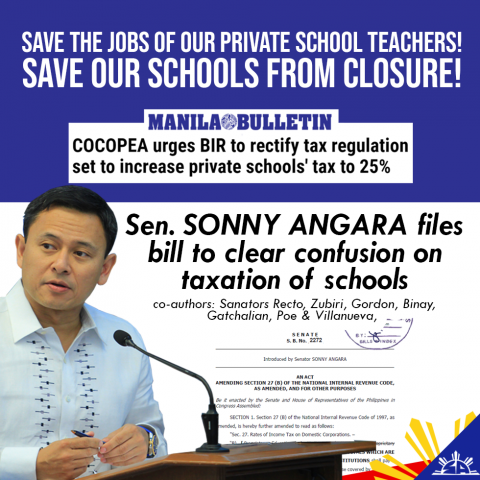
As more senators sign as co-sponsor of the bill explicitly declaring that private schools are exempt from the 25 % corporate income tax, its author, Sen. Sonny Angara, predicts its approval by an overwhelming majority in the Senate.
“How can you not support a measure that is fair and just, and corrects an injustice to private schools?” Angara, who introduced Senate Bill 2272 said.
“The bottomline is that private schools have been paying for more than a half-a-century a preferential tax rate of 10% so how could a law that cuts taxes for all corporations instead increases by 150 % the taxes private schools pay?” Angara added.
Seven senators have signed on to Senate Bill 2272 filed by Angara that seeks to prevent the possible loss of jobs of thousands of teachers and non-teaching personnel in private educational institutions and the livelihood of several small businesses due to an erroneous interpretation of a provision of the Tax Code.
Senators Joel Villanueva, Nancy Binay, Sherwin Gatchalian, Grace Poe, Richard Gordon, Majority Leader Juan Miguel Zubiri, and Senate President Pro Tempore Ralph Recto have been made co-authors of SB 2272 that seeks to amend Section 27(B) of the National Internal Revenue Code, as amended.
“Sa nakaraang taon ay nakita natin ang pagsara ng maraming pribadong paaralan dahil sa pandemiya kung saan pinagbawal ang face-to-face education. Dahil dito ay maraming guro na ang nawalan ng trabaho at mas marami pa ang inaaasahan na maaapektuhan kung ipapatupad ang probisyon ng Revenue Regulation 5-2021 ng BIR ukol sa mga pribadong eskwelahan,” Angara said.
“Sa panahon na ito kung saan napakaraming Pilipino ang naghihirap dahil sa pademiya, hindi napapanahon ang pagpapataw ng mataas na buwis, partikular sa mga pribadong eskwelahan na sa kasalukuyan ay hirap na hirap sa kanilang hinaharap na krisis,” Angara added.
Apart from the personnel of the private schools, the livelihood of numerous small and medium businesses linked to these schools would also be adversely affected.
Private school organizations have raised their concerns about the impact of the said BIR RR 5-2021 on them at this time when their members are struggling to survive.
In RR No. 5-2021, the BIR interpreted the provision of the Corporate Recovery and Tax Incentives for Enterprises Act (CREATE) on the preferential tax treatment on proprietary educational institutions and hospitals to mean that an educational institution should both be proprietary and non-profit in order to qualify for the tax rate of 10%, which would go down further to one percent on their taxable income until June 30, 2023.
Angara explained in his bill that “Being proprietary and non-profit is a legal impossibility” because the term proprietary generally means one that is privately-owned and managed and run as a profit-making organization.
“The intention of CREATE was to provide tax relief to industries affected by the pandemic and not to place an additional burden on them just like what this BIR issuance has ended up doing to the private educational institutions,” Angara said.
“CREATE is being trumpeted as a measure to save companies from death during this pandemic. So how can it be that the language in CREATE ends up as the notes for the funeral taps for these schools?” Angara added.
Instead of shoring up proprietary educational institutions during the pandemic with the much needed reduction in the income tax rate from 10% to 1% sought under the CREATE Act, Angara said this erroneous regulation would instead subject them to the regular rate of 25%.
SB 2272 amends Sec. 27(B) of the NIRC, as amended, to clearly indicate that the preferential tax rate shall apply to: 1. All proprietary educational institutions, including those that are stock and for profit; and 2. Non-profit hospitals.
Angara noted that the wording of the said section of the NIRC has created ambiguity as to whom the preferential tax rate would apply to.
He said this also contradicts Article XIV, Sec. 4(3) of the Constitution, which provides for the entitlement of exemption from taxes and duties: all revenues and assets of non-stock, non-profit educational institutions used actually, directly, and exclusively for educational purposes.
The same provision of the Constitution also states that “Proprietary educational institutions, including those cooperatively owned, may likewise be entitled to such exemptions subject to the limitations provided by law, including restrictions on dividends and provisions on reinvestment.”
-30-
